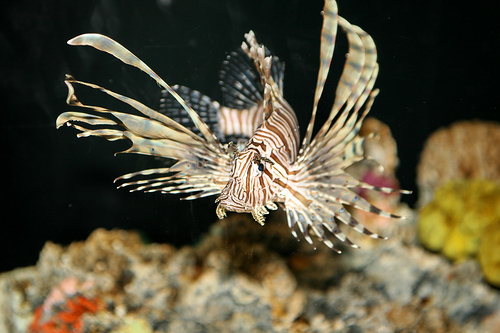 The last time you visited an aquarium, you probably saw one. With their zebra-like stripes, multiple spines, and elaborate fins, they’re quite beautiful and incredibly distinctive. But red lionfish are also voracious carnivores that breed like rabbits and are poisonous to boot. And they’re invading the coastal waters of the Atlantic Ocean.
The last time you visited an aquarium, you probably saw one. With their zebra-like stripes, multiple spines, and elaborate fins, they’re quite beautiful and incredibly distinctive. But red lionfish are also voracious carnivores that breed like rabbits and are poisonous to boot. And they’re invading the coastal waters of the Atlantic Ocean.
As with most invasive species, researchers have had trouble determining exactly where and when the first lionfish appeared off the wrong seaboard. Normally native to warm Pacific regions, they are incredibly popular additions to salt water aquariums, second only to clown fish. And it is from these aquariums, particularly private outdoor setups in Miami damaged by Hurricane Andrew in 1992, that authorities believe the progenitors of the current reef invasion came. Adapting well to the warm waters of the Gulf Stream and lacking any significant predators in the Atlantic Ocean, lionfish spread and prospered. They have been sited as far north as New York and Rhode Island and now abound in the Caribbean and off the Florida Keys. Even off the shores of North Carolina, dive deeper than 100 feet, and they are absolutely everywhere.
The problem, of course, is that Atlantic reefs are already strained due to overfishing, pollution, and global warming. Now, however inadvertently, we have introduced a new predator with no natural enemies into this fragile ecosystem, and they are consuming everything, including crustaceans and fish up to two thirds their own size. One scientist observing the invasion watched as a single lionfish devoured 20 smaller fish in the space of half an hour. Various individual researchers as well as environmental groups are focused on the problem, trying to find ways to combat growing populations as well as reducing those that already exist. But they all warn that if lionfish remain unchecked, they could decimate populations of herbaceous reef-dwelling fish and allow seaweed and other plant life to encroach on the threatened environment as well as further decimate overfished populations of snapper and grouper. Even ignoring the potential environmental harm at stake, the economic implications are staggering. Tourism and commercial fishing, staples of the economies of many coastal areas in the U.S., might never recover from such blows.
 Current answers to this threat are underdeveloped at best. The Nation Oceanic and Atmospheric Administration (NOAA) and the Reef Environmental Education Foundation (REEF) are working with several researchers as well as local governmental authorities and private individuals to track lionfish sightings in affected waters. In North Carolina, the NOAA is reaching out both to sport divers and, strangely enough, restaurateurs. Since lionfish have no natural predators in the Atlantic Ocean and since grouper and sharks, which do feed on them in the Pacific, are so overfished themselves, humans may be the only species capable of combating the invasion at this time. Ironically, lionfish apparently have a delicate flavor, similar to that of both grouper and snapper, species which they are threatening. Their venom, while extremely painful and occasionally even paralyzing, is not deadly, save in cases of preexisting medical conditions, and is actually denatured by the cooking process. The biggest problem lies in learning how to safely catch them, particularly in commercially viable quantities.
Current answers to this threat are underdeveloped at best. The Nation Oceanic and Atmospheric Administration (NOAA) and the Reef Environmental Education Foundation (REEF) are working with several researchers as well as local governmental authorities and private individuals to track lionfish sightings in affected waters. In North Carolina, the NOAA is reaching out both to sport divers and, strangely enough, restaurateurs. Since lionfish have no natural predators in the Atlantic Ocean and since grouper and sharks, which do feed on them in the Pacific, are so overfished themselves, humans may be the only species capable of combating the invasion at this time. Ironically, lionfish apparently have a delicate flavor, similar to that of both grouper and snapper, species which they are threatening. Their venom, while extremely painful and occasionally even paralyzing, is not deadly, save in cases of preexisting medical conditions, and is actually denatured by the cooking process. The biggest problem lies in learning how to safely catch them, particularly in commercially viable quantities.
To this end, the NOAA will be sponsoring a series of lionfish rodeos, the first scheduled for May 18 – 19, in which scientists and sport divers will collaborate to learn to safely catch, handle, and prepare lionfish for human consumption. Later rodeos will likely include studies on repopulation rates and carrying capacities. The NOAA hopes the publicity will convince local eateries to add lionfish to their menus.
As researchers continue to study this encroaching species for any and all methods of control on both sides of the continental U.S., they hope to reestablish populations of possible natural predators including shark, grouper, and even moray eels. But in the meantime, researchers are desperate and are willing to do whatever they can — even if that is just, as in the words on one local reporter, merely “spears, nets, and tartar sauce.”





